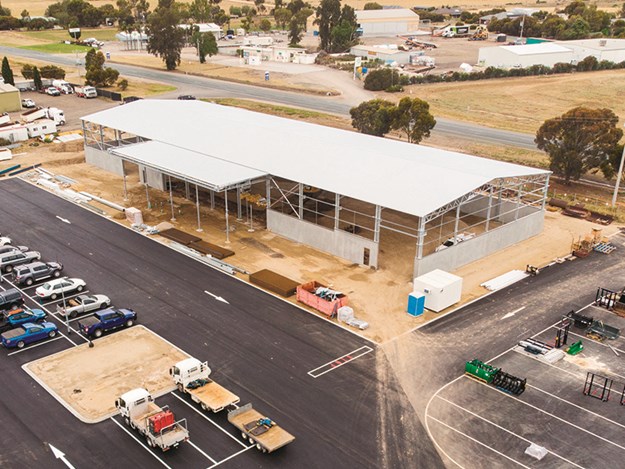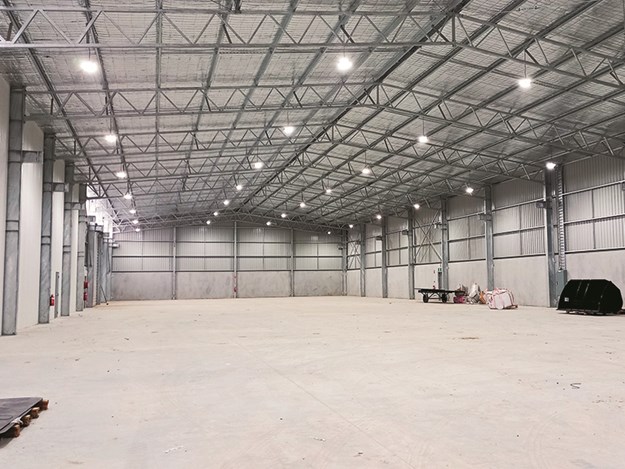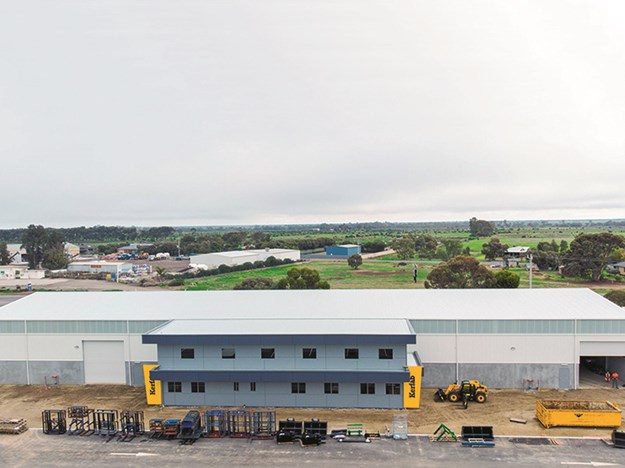Burgeoning demand for its bale forks has led Kerfab to build a second factory as it looks to double its manufacturing capacity during a period of COVID-19 recovery
Kerfab’s evolution can be summed up in one simple sentence.
“Year in, year out, we’ve been consistently building more and more bale forks just because we will acquire new customers, and they’re happy with them,” the manufacturer’s marketing coordinator Ryan Hoban says.
Continual growth in a company’s core product is a clear measure of success, and that has been the case for the Australian-made attachments manufacturer.
Further proof of Kerfab’s growth is shown by the building of a second factory right next to its existing one in the northern Victorian town of Kerang.
The new factory is expected to open around July and will double Kerfab’s manufacturing capacity.
 |
|
The new factory in Victoria will double Kerfab’s manufacturing capacity
|
It is a big investment in the future, but Hoban says it is necessary to continue the strength of its local manufacturing and ensure lead times can be reduced following the COVID-19 pandemic.
“It’s going to take in quite a few more staff and there’s going to be robots and automation in there as well,” he says.
“It will help us to pump out the numbers of bale forks that we need.
“Lead times have gone out, pretty much like everyone else in the industry, just because of everything that’s happened with COVID-19 and the huge increase in demand. This will allow us to reduce those lead times massively, be able to have items in stock and dispatch them really quickly.”
While not immune from the issues facing all manufacturers due to the pandemic, the fact Kerfab manufactures all its bale forks and agricultural attachments locally places the company at a considerable advantage.
“There are a few benefits to that,” Hoban says.
“One is customisation, so we can actually make an item exactly how someone wants it, and the second obviously is we’re not waiting months for containers that are sitting in a dock somewhere, because no one can get containers at the moment, and freight costs are through the roof.
“We’re less affected by everything with international shipping so we can still meet customers’ needs, just simply because it’s made here in Australia.”
 |
|
Hundreds of bale forks will be made in the new facility
|
Kerfab has historically offered seven-day lead times on its ‘Attach + Go’ range, an ongoing promotion relevant to a number of its core products, including some bale forks, telehandler buckets and pallet forks.
Hoban says this was “extremely popular” before COVID-19 scuppered the ability to offer this quick turnaround.
“Once we get this new factory up and running, our aim is to get back to seven day lead times on those core products,” he says.
Lead times are a significant factor in any agricultural purchase and Hoban says Kerfab can provide accurate information about when customers can receive their product.
“We’ve really focused in on our production side of things, manufacturing and having all the systems and processes in place so we can give accurate lead times and we can meet those these times when we do give them,” he says.
“It’s not just a guess; we’ve got all our systems, processes, and software in the company.
“It’s also not someone saying something like ‘I reckon we can knock that out in two weeks’, it’s all planned out meticulously by the operations and production departments.”
Bale forks are one of Kerfab’s biggest sellers, with Hoban estimating “hundreds” are made and sold every year.
It has been a steady and consistent growth, aided by growing demand from major dealers in addition to farmers.
 |
|
By manufacturing its products locally, Kerfab can supply its machinery attachments quickly
|
“We sell directly to dealers Australia wide as well as to individuals, but we always recommend end users to go through their local dealer,” Hoban says.
“We work with all machinery manufacturers and our ability to build attachments to suit any machine make, model, or hitch type puts us in a pretty good position.”
Kerfab is a growing company, with staff numbers having roughly doubled from approximately 30 to 60 in the past four years.
Another example of the company’s growth, plus its ability to cater quickly to customer needs, is in its Western Australian presence.
The company’s second base is located in the south-eastern Perth suburb of Canning Vale, meaning Kerfab can get its products and parts to where WA customers need them, while also ensuring issues can be dealt with quickly.
“We’ve moved into a bigger warehouse and office in WA where we’re stocking more agricultural and construction products,” Hoban says.
“By stocking a lot of ag products in Perth itself, we can service the WA market in their state
Hundreds of bale forks will be made in the new facility instead of trying to do everything from Victoria.
“Everything is still made in Kerang and then shipped across there and kept in stock, and custom items are shipped there for distribution. Having a local contact if there is an issue also helps.
“Obviously, WA is a pretty big state, but just having somebody in Perth alone makes a pretty big difference in that, if a customer needs an answer to a problem or they have a problem, they can get in touch with somebody who is maybe only a few hundred kilometres away instead of a few thousand.”
Kerfab’s factory and head office is located at 11 Tate Drive, Kerang, Victoria, while its WA office and warehouse is at 60 Tulloch Way, Canning Vale. The company can be contacted on 1800 818 079 or through www.kerfab.com.au

